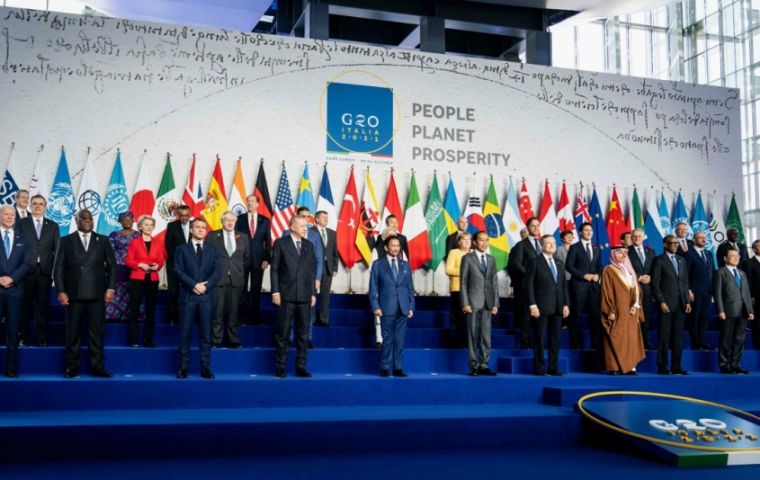MercoPress. South Atlantic News Agency
G20 rounds up Rome Summit with compromise declaration on climate neutrality
 The G20 declaration was found vague and disappointing ahead of Glasgow's climate summit
The G20 declaration was found vague and disappointing ahead of Glasgow's climate summit Leaders of the G20 have issued their final statement Sunday at the end of a two-day summit, in which they pledged to increase efforts to reach the goal of limiting global warming to 1.5 degrees Celsius, a goal which is in line with a global commitment made in 2015 through the Paris Climate Accord.
As per those standards, countries have agreed on the need to keep global warming to “well below” 2 degrees Celsius above pre-industrial levels, and preferably to 1.5 degrees Celsius. “We recognize that the impacts of climate change at 1.5°C are much lower than at 2°C. Keeping 1.5°C within reach will require meaningful and effective actions and commitment by all countries,” the G20 document said.
Sunday's declaration was the result of days of a tough negotiation, and it leaves huge work to be done at the broader United Nations COP26 climate summit in Scotland, which starts this week. As they were ready to move on to Glasgow, the G20 leaders stressed the Paris targets needed to be achieved “by or around mid-century.” They also agreed to end public financing for coal-fired power generation abroad but set no target for phasing out coal domestically — a clear nod to top carbon polluters China and India.
The Group of 20 countries, which represent more than three-quarters of the world's greenhouse gas emissions, had been looking for common ground and solid commitments on how to reduce emissions while helping poor countries deal with the impact of rising temperatures. Without them, momentum could be lost for the larger annual talks in Glasgow that officially opened Sunday and where countries from around the globe will be represented, including poor ones most vulnerable to rising seas, desertification and other effects.
“We must accelerate the phasing-out of coal and invest more in renewable energy,” said Italian Premier Mario Draghi.
“We also need to make sure that we use available resources wisely, which means that we should become able to adapt our technologies and also our lifestyles to this new world,” he added.
The G20 also reaffirmed past commitments by rich countries to allocate US $ 100 billion annually to help poorer countries cope with climate change, and committed to scaling up financing.
The closing statement also highlighted G20 leaders will “accelerate our actions across mitigation, adaptation and finance, acknowledging the key relevance of achieving global net-zero greenhouse gas emissions or carbon neutrality by or around mid-century.”
But the expression “mid-century” opened up a plethora of interpretations. For some, it meant 2050 in the strict sense, while others believed that “given the diversity of the G20 countries ... it means everyone agrees to a common goal while providing a bit of flexibility to take into account national diversity.” Some countries have set 2050 as their deadline for net-zero emissions, while China, Russia and Saudi Arabia -the countries US President Joseph Biden criticized specifically- are aiming for 2060.
The future of coal, a key source of greenhouse gas emissions, has been one of the hardest things for the G20 to agree on. At the Rome summit, leaders agreed to “put an end to the provision of international public finance for new unabated coal power generation abroad by the end of 2021.”
That refers to financial support for building coal plants abroad, something Western countries have been moving away from and major Asian economies is now doing the same: Chinese President Xi Jinping announced at the U.N. General Assembly last month that Beijing would stop funding such projects, and Japan and South Korea made similar commitments earlier in the year.
The failure of the G20 to set a target for phasing out domestic coal use was a blow to Britain, which had hoped there would be progress on the issue at COP26, although the UK is still expected to push for “ambitious commitments” at Glasgow, it was reported.
While Italian Prime Minister Mario Draghi and French President Emmanuel Macron described the G20 as a success, the outcome disappointed the chief of the UN as well as the leader of the United Kingdom.
Draghi said the declaration went further on climate than any G20 statement before it. He noted that it referred to limiting global warming at the 1.5C threshold that scientists say is vital to avoid disaster. “We changed the goalposts,” Draghi told reporters.
UK Prime Minister Boris Johnson called the G-20’s commitments were mere “drops in a rapidly warming ocean,” and UN Secretary-General Antonio Guterres agreed the outcome was not enough.
“While I welcome the #G20′s recommitment to global solutions, I leave Rome with my hopes unfulfilled – but at least they are not buried,” Guterres tweeted. Canadian Prime Minister Justin Trudeau concurred: “There’s no question that Canada, along with several other countries, would have liked the stronger language and stronger commitments on the fight against climate change than others,” he said.
Youth climate activists Greta Thunberg and Vanessa Nakate issued an open letter to the media as the G20 was wrapping up. “The climate crisis is only going to become more urgent. We can still avoid the worst consequences, we can still turn this around. But not if we continue like today,” they wrote, just weeks after Thunberg shamed global leaders for their “blah blah blah” rhetoric during a youth climate summit in Milan.
Russian leader Vladimir Putin and Chinese President Xi Jinping are not expected to attend the conference in Glasgow, although they are sending senior officials to the international COP26 talks.




Top Comments
Disclaimer & comment rulesCommenting for this story is now closed.
If you have a Facebook account, become a fan and comment on our Facebook Page!